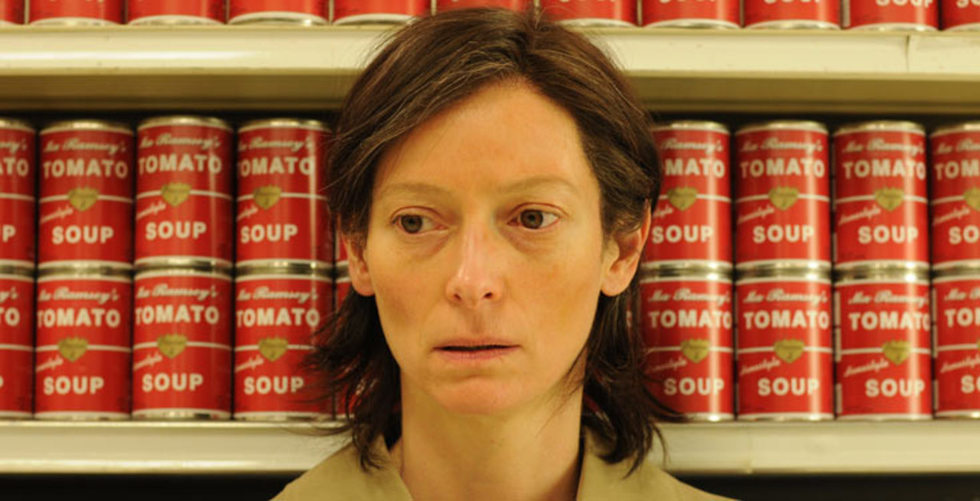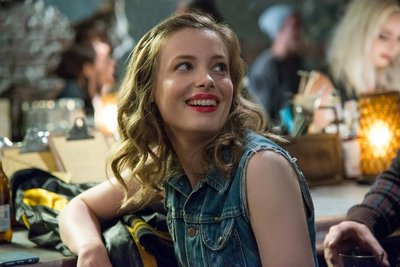
BY ZACHARY WIGON |
A Return to Form-alism: We Need to Talk About Kevin
Lynne Ramsay’s first film in nine years includes a haunting turn by Tilda Swinton and a chilling Ezra Miller.


Courtesy of Oscilloscope Laboratories
The past nine years have surely been strange and frustrating ones for Lynne Ramsay. After completing Morvern Callar in 2002, it appeared that she was tapped to direct The Lovely Bones for DreamWorks – but instead, amidst (one imagines) some Hollywood inside-baseball moves, she was ditched in favor of Peter Jackson (and we all saw how well that turned out).
Finally, Ramsay returned at this year’s Cannes Film Festival with her latest feature, We Need To Talk About Kevin. An adaptation of the award-winning novel by Lionel Shriver, the film is a heavily formalist, highly stylized portrait of how one woman’s (Tilda Swinton) life is undone by a violent event perpetrated by her unhinged son (Ezra Miller). Also in the film is the coming-apart of the marriage between the woman, Eva, and her husband (John C. Reilly), which is not dealt with head-on, yet is painfully apparent nevertheless, and all the more poignant for the subtlety with which it is dealt.
Alternating between the present-day and memories that steadily march forward in time, the film is heavily couched in Eva’s subjectivity, a subjectivity that, due to an intense trauma, is at times unable to differentiate between past and present. The film opens with a long, nearly dialogue-less sequence which cuts across years of Eva’s life with ease, and in general the film is constructed with a confidence of storytelling (no expository dialogue, nothing over-explained) that is found all too rarely in contemporary cinema. I had the chance to speak with Ramsay recently at her hotel in New York.

Courtesy of Oscilloscope Laboratories
Tribeca: It must have been frustrating, the gap between Morvern Callar and this film, and all the stuff with The Lovely Bones.
Lynne Ramsay: Oh yeah. There’s a lot of assholes in the world, you know? So you need to walk quietly but carry a big stick. I’d rather be pure and have my karma than be rich. I was brought up as a working-class girl; I was poor all my life.
Tribeca: You get some filmmakers who try to switch their taste, their style, to appeal to a wider audience, and you find that it often doesn’t really work. It’s tough to make something more commercial than what you’re cut out for.
Lynne Ramsay: I can’t really make anything else. It’s not in my personality. I’ve got to stick to my guns. It kills me to go the other way. If I’d tried to do The Lovely Bones for DreamWorks and they’d tried to change my vision, I probably would’ve shot myself!
But I don’t like to make films that alienate audiences – I was brought up on Bette Davis and Mildred Pierce, Douglas Sirk, Imitation of Life. My mum and dad went to the cinema all the time — Hitchcock and stuff like that. So I don’t see myself as trying to do these arty films either.
I tried to make Kevin accessible and funny. It’s a dark story, but everyone’s life, in families, there are always a lot of secrets. In every family I think there are some performances, some lies. Of course Kevin’s a very extreme version. But it’s a fantasy; it’s not a social comment about high-school killings; that’s not what the film is about. I hate these people who say, “It’s so dark, it’s so grim” – I think people should be open to cinematic experience.
I try to be generous with the audience. I don’t want to patronize an audience. [A lot of films,] they’ve got a lot of music, tugging at your heartstrings, you know, it’s super patronizing. I feel patronized. And there’s always redemption. You know, in the real world, sometimes there’s not redemption.

Courtesy of Oscilloscope Laboratories
Tribeca: It’s interesting, people do bring a lot of associations to this film, like they think it’ll be a social commentary kind of film, but really it’s more of an atmospheric tone poem –
Lynne Ramsay: Remember Alfred Hitchcock? He used to make movies about images and sound, remember, back in the day? [Laughs] Taxi Driver, Mean Streets. These are satisfying movies, although they’re not easy. I mean, I think the filmmaker I most admire is David Lynch: he’s a true original, he’s stuck to his own voice, and he utilizes sound in a totally original way, which harks back to Fellini and Hitchcock.
I think we’ve become very lazy, as filmmakers. I mean, I watched seven movies on the plane; I couldn’t finish one. And I was brought up on commercial movies – I never saw an art-house film until I was fifteen or sixteen. Blue Velvet, or Fear Eats The Soul. Then Alan Clarke, who I think Gus Van Sant should give a big thank-you to –
Tribeca: Well, he has –
Lynne Ramsay: Yeah, yeah, it’s just that not a lot of people know his work. I mean, he discovered Tim Roth, discovered Gary Oldman. He should be revered, and no one knows him apart from filmmakers. We were lucky in the UK; his work was on TV. I’d go to school and be like, “Did you see Made In Britain last night?” Schoolkids would talk about it.
Tribeca: I think this is an exciting time for UK filmmakers, right now. I was thinking about how little exposition you have in this film, which I think is great. You can’t give too much to the audience – it’s like, if you’re on a date with someone, and you tell them too much about yourself too easily, they’re not going to want to sleep with you.
Lynne Ramsay: [Laughs, high-fives Tribeca]
Tribeca: You have to make them work for it a little bit. It’s the same thing with filmmaking.
Lynne Ramsay: Yeah, otherwise you get to know each other too soon, and you don’t trust it. It’s a really nice analogy.

Courtesy of Oscilloscope Laboratories
Tribeca: Anyway, that approach to making the audience work reminded me a bit of Steve McQueen, another contemporary UK filmmaker.
Lynne Ramsay: I love his work. I saw his work as a video artist. I went to see this piece about the miners who go down to the deepest mine in the world, and I’m very claustrophobic, and I’m getting the shakes, ’cause it’s black, and the sound was amazing. He really knows how to use sound. He thinks in a different way. I was shaking and I started to cry. It really disturbed me. That piece was really amazing. I thought to myself, “Wow, here’s an artist who really uses cinema.” It’s so dark, it really exposes your worst fears; you feel like you’re going down there.
Tribeca: You’ve mentioned sound a bunch of times – I thought the sound design and intense score for the film was really excellent. Jonny Greenwood did the score. What was working with him like?
Lynne Ramsay: He’s a very shy, wonderful man. He’s the real linchpin of Radiohead. I sent him a rough cut, and it was kind of like, chain-gang tracks, I felt she was living in a kind of penury, but I didn’t want to do dark strings, it felt too obvious. Jonny added little touches and I asked for four cues, and he gave me 200 pieces of music. I worked with a brilliant sound designer, so sweet and technical. I’m a big fan of writing sounds in my scripts. So he knew what I wanted, and he was collecting sounds as we were doing the film.
Tribeca: The scene where Eva’s visiting her son in prison and he’s biting his nails, the sound design there is so acute, so expressive.
Lynne Ramsay: It’s violent in a very tiny way. I remember seeing Clean, Shaven, and there’s this scene in the film where the guy thinks there’s a transmitter somewhere in his body, and he takes his fingernail off, and it’s the most violent act I’ve ever seen in a movie. I see people killing each other all the time, and you feel nothing, and for this, I said wow, this is real violence.
Tribeca: Let’s talk about Kevin as a character. This film is so well-crafted –
Lynne Ramsay: Yeah, but I won’t get recognition for that ‘cause I’m a woman.
Tribeca: I hope you will.
Lynne Ramsay: Sorry, that’s a bit feminist, I don’t even feel that way, I’d never say that, but it is a bit bullshit. And the only woman who’s won an Oscar, Kathryn Bigelow, makes a guy’s film. I think that’s outrageous. I think I’m just as good a filmmaker as any of these guys out here, technically speaking.
Tribeca: I think certain films – like, Fish Tank, by Andrea Arnold, is what I think of when I think of a contemporary UK kitchen-sink drama – but this film is not about psychology, it’s about tone and atmosphere. So what I’m wondering is, in terms of the psychology of Kevin, how much did you want to articulate a specific psychology versus just showing his actions and letting the audience draw conclusions?
Lynne Ramsay: Very much the latter. I think there’s evil in all of us, we’re designed as killing machines, we have nails and teeth. He’s an extreme version. But also, I filtered him through Eva. We don’t know if she’s reliable. She’s taking Valium, she takes pills in the beginning. Also, there’s storytelling in the film, like any movie – hark back to Hitchcock, the best visual storyteller in the world – basically, I think all good filmmakers try to push the boundaries a wee bit. I think that’s what Steve [McQueen] does. Nicolas [Winding Refn] too.
With my actors I’m very warm; it’s a family. I mean, I was jamming with John C. Reilly; he got me a guitar. Tilda had her children there, hanging out on the weekends. We needed to decompress; it was so intense.

Tribeca: Tell me about the look you settled on for Kevin.
Lynne Ramsay: Well, it’s anamorphic, Seamus is wonderful, but after I met Seamus I bought a 5D, the Canon, which I used in the film in a particular way. I mixed the 5D with scope. I went to a bar in New York, really dark, and started testing the camera, and I was like, oh my word, this can really shoot in low light. Now they’re bringing one out that’s 4,000 ASA. That’s like seeing in the dark. It was really impressive. And it has a lot of texture. And you get this shallow depth of field.
So we used that in super low light, like the Halloween scene, and for a few night scenes. We tested the hell out of it. He shot me and my husband in the street at night in the rain on the 5D. We were all a little drunk. It was so natural.
And in the beginning of Kevin, that was the first scene we shot, Tilda and John in the rain, and I was really hoping it was going to rain, although the forecast said it wasn’t, and right when we got there, the heavens opened, and I thought, “This is going to be good, this movie.”
We Need to Talk About Kevin opens Friday, January 13, at Angelika Film Center and Lincoln Plaza Cinemas in New York, with more cities to follow. Find tickets.
 Like We Need to Talk About Kevin on Facebook.
Like We Need to Talk About Kevin on Facebook.
 Check in to We Need to Talk About Kevin on GetGlue.
Check in to We Need to Talk About Kevin on GetGlue.
Watch the trailer:

